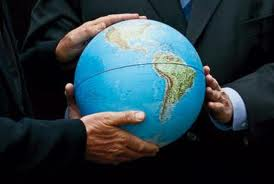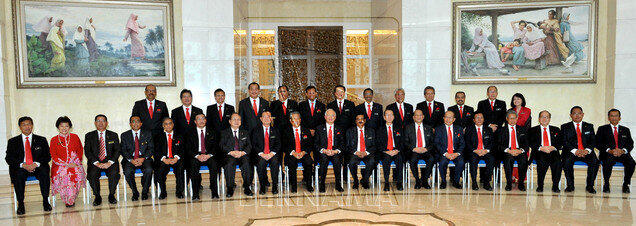
The Second World War had devastated the colonial empires of Western Europe, leaving the United States as the capitalist world’s undisputed superpower. At the same time, the war demolished the colonial system that had defined the imperialist era up until that point, giving rise to a new stage of imperialism called neo-colonialism.
In conjunction with this shift from colonialism to neo-colonialism, another shift occurred from intra-imperialist rivalry to intra-imperialist unity, as the former colonial empires joined together under the leadership of the United States into one imperialist world system, which I have labeled Trilateral Imperialism (in reference to the Triad: the U.S., Western Europe and Japan).
To be sure, there were still contradictions among imperialist nations, but these were non-antagonistic and could be resolved without war. No longer would Western Europe devour itself in barbaric conflicts over colonial possessions; now, they would merge together and plunder the third world as one.
As the last standing capitalist superpower, the United States was charged with redesigning the imperial landscape after WWII. The former colonial empires of Western Europe were in shambles and no longer had the ability to manage their colonies. The United States adopted a comprehensive aid program to help rebuild Europe and Japan, investing some of its capital surplus into the devastated economies of the capitalist world. The Marshall Plan, as it was called, was no altruistic gesture stemming from America’s noble spirit, but rather a way for American capital and products to penetrate European markets. In the end, the Marshall Plan pumped $13 billion into the reconstruction of Europe, reviving capitalism on a world scale.
The recovery of capitalism in fact began at the onset of WWII in the United States, with the war effort stimulating production on a massive scale. The New Deal government of Franklin D. Roosevelt also began implementing Keynesian economic policies, which would come to characterize the post-war capitalist economy. Keynesianism argued that capitalism, due to its inherent tendency towards underconsumption, required government intervention in the economy to stimulate aggregate consumption through government spending and progressive taxation. Similar measures were adopted in capitalist Europe after the war, resuscitating the economy and creating welfare states that limited the worse social consequences of capitalism, such as poverty, unemployment, and economic insecurity.
Along with the Marshall Plan, the U.S. pressured Britain and France to dismantle their colonial empires so that the whole third world could be opened up to American capital. Although the decolonized countries were seemingly independent, U.S. policy makers believed that these countries’ only purpose was to “provide raw materials, investment opportunities, markets and cheap labor” to “complement the industrial countries of the West” (Chomsky, 1992). Thus, the primary threat to the U.S.-led order were “’nationalist regimes” that dared to use their national resources to attain the “immediate improvement of the low living standard of the masses’”(Chomsky, “On Foreign Policy). The so-called “Cold War,” then, was conceived to be a war for U.S. control over the third world.
Formal colonies were no longer necessary to ensure the continuous transfer of wealth from the periphery to the metropolis and that is why the United States pushed for the abolition of colonialism. As one scholar of imperialism noted, “colonialism, considered as the direct application of military and political force, was essential to reshape the social and economic institutions of many of the dependent countries to the needs of the metropolitan centers. Once this reshaping had been accomplished economic forces – the international price, marketing, and financial systems – were by themselves sufficient to perpetuate and indeed intensify the relationship of dominance and exploitation between mother country and colony” (Magdoff, 139). Thus neo-colonialism was just as effective as colonialism.
The Cold War is often misinterpreted as a global conflict between the United States and the Soviet Union, the two contending world powers, with the U.S. working to contain Soviet ambitions of world domination. However, as declassified U.S. policy documents make clear, the primary threat posed by the Soviet Union was its willingness to supply military and economic support to third world regimes that were targets of U.S. aggression and subversion (NSC 68). The Soviet Union thus served to deter and restrain U.S. actions in the third world, which was unacceptable to U.S. imperial ambitions. Further, the Soviet system with its “autarkic command economy interfered with U.S. plans to construct a global system based on (relatively) free trade and investment, which, under the conditions of mid-century, was expected to be dominated by U.S. corporations and highly beneficial to their interests, as indeed it was” (Chomsky, 1992). To be sure, the Soviet Union betrayed the cause of socialism after the death of Stalin, becoming a social imperialist power in its own right. However, its imperial aims were limited to the region allotted to it under the Malta agreements and the threat it posed to the U.S. was its willingness to support nationalist third world regimes resistant to U.S. imperial demands.
Throughout the Cold War, the military-industrial-complex became a major part of the U.S. economy, and thus a catalyst for sustained growth, albeit sluggish starting in the 1970’s. For the Soviet Union, however, the “arms race” had the opposite effect of bleeding the Soviet economy and intensifying its internal contradictions until it imploded in 1989. With the collapse of the Soviet Union the Cold War came to an end, and with it, according to some, so did history. The triumph of the United States and Western Europe over the Soviet system proved to most people the superiority of free markets and capitalism. Free market euphoria swept the globe, giving birth to the new world order of neo-liberal capitalism.
Neo-liberalism, in stark contrast to Keynesianism, argued that economic growth required an end to government intervention in the economy (except in the military and prison sectors). Now the “invisible hand” of the market should rein unhindered, naturally allocating economic resources fairly and efficiently, creating a healthy equilibrium between supply and demand. Thus the era of Keynesianism and welfare capitalism came to an abrupt end, once again transforming the imperialist landscape.
The shift to neo-liberalism in the metropolis did not end neo-colonialism in the third world however. In fact, the neo-liberal onslaught began in the third world much earlier than it began in the developed world, starting with the U.S.-instigated coup in Chile in 1973. The third world was always encouraged to adopt trade liberalization and free market policies in order to facilitate the transfer of wealth from the third world to the U.S. and Europe. The shift to neo-liberalism in the metropolis only changed how neo-colonialism was enforced on the third world. Now international institutions, representing the collective economic will of the imperialist powers, emerged to impose neo-colonial policies on third world countries. The World Bank and International Monetary Fund gave third world countries “development loans” on the condition that they adopted “structural adjustment programs” designed to open their economies to western markets. Of course these policies did not lead to development, but only more intense underdevelopment for third world nations.
The neo-liberal empire of today is not the empire of one imperialist nation, but the empire of transnational corporations, based in the Triad, and enforced through U.S. and NATO military force. Neo-liberalism will not lead to the liberation or development of third world nations, but only their further underdevelopment and exploitation, as recent events in Iraq, Afghanistan and, most shamefully, Libya have proven.
The empire of today is the most destructive and dangerous empire that has ever confronted the human race. In the name of freedom, democracy, and economic prosperity, it is pillaging the third world at an unprecedented rate, leading to devastating wars of terror and occupation. The failures of capitalism should be clear to everyone not on its payroll, and the choice facing humanity today should be even more clear: Socialism or barbarism.
About Global Research
Centre for Research on Globalization / Centre de recherche sur la mondialisation
The Centre for Research on Globalization (CRG) is an independent research and media organization based in Montreal. The CRG is a registered non-profit organization in the province of Quebec, Canada.
In addition to the Global Research websites, the Centre is involved in book publishing, support to humanitarian projects as well as educational outreach activities including the organization of public conferences and lectures. The Centre also acts as a think tank on crucial economic and geopolitical issues.
The Global Research website at www.globalresearch.ca publishes news articles, commentary, background research and analysis on a broad range of issues, focussing on social, economic, strategic and environmental processes.
 The Global Research website was established on the 9th of September 2001, two days before the tragic events of September 11. Barely a few days later, Global Research had become a major news source on the New World Order and Washington’s “war on terrorism”.
The Global Research website was established on the 9th of September 2001, two days before the tragic events of September 11. Barely a few days later, Global Research had become a major news source on the New World Order and Washington’s “war on terrorism”.
Since September 2001, we have established an extensive archive of news articles, in-depth reports and analysis on issues which are barely covered by the mainstream media.
In an era of media disinformation, our focus has essentially been to center on the “unspoken truth”.
During the invasion of Iraq (March-April 2003), Global Research published, on a daily basis, independent reports from the Middle East, which provided an alternative to the news emanating from the “embedded” journalists reporting from the war theater. Since 2004, Global Research has provided detailed analysis and coverage of US-NATO-Israel preparations to wage a pre-emptive nuclear attack on Iran.
Notes
- Chomsky, Noam, “Deterring Democracy,” (1992), retrieved online athttp://books.zcommunications.org/chomsky/dd/dd-c01-s07.html.
- Chomsky, Noam, “What Uncle Sam Really Wants,” retrieved online athttp://books.zcommunications.org/chomsky/dd/dd-c01-s07.html.
- Magdoff, Harry. Imperialism: From the Colonial Age to the Present. Monthly Review Press (1978).
SUMBER : http://www.globalresearch.ca/imperialism-the-cold-war-and-the-contradictions-of-decolonization/5334692
BLOG ABG




No comments:
Post a Comment